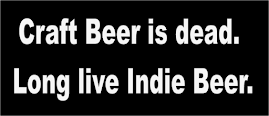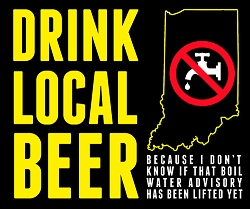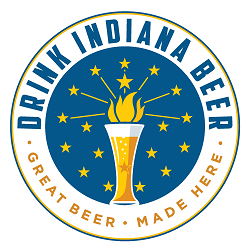Is there free will?
Do supernatural beings exist?
What is meant by "craft"?
I still use the word if it suits me, primarily when it's easier to facilitate communication without delving into what might as well be theology.
However, at the current time it matters little to me. My basic tool for making determinations in "craft" as in other decisions about where my money goes remains this working definition of independent business, as offered by the American Independent Business Alliance (AMIBA):
- (I) Private, worker, community or cooperative ownership.
- (II) At least 50% locally-owned.
- (III) Decision-making authority is vested in the local owners and not subject to conditions dictated remotely.
- (IV) The business has a limited number of outlets, which are limited to a 150 mile radius.
It isn't perfect, and at times I ignore it, because the point always has been shift. I try to patronize as few chains as possible, and while this isn't easy when it comes to buying groceries, it's not so hard to decide when looking for beer, and where to drink it.
Can craft beer really be defined? We're about to find out, by Tony Naylor (The Guardian)
Next month, possibly in a secret underground bunker, but more likely in a pub, the leading lights of new wave British brewing will meet to do something that, so far, beer geeks have found impossible. They will define what craft beer is in the UK.
This attempt by the new United Craft Brewers (UCB) to codify craft is essential in their mission to, “promote and protect the interests of British craft brewers, their beers and beer enthusiasts.” UCB has been established by the scene’s big guns – Brewdog, Beavertown, Magic Rock and Camden Town Brewery are among its founders ...
... Defining what is and isn’t craft beer is notoriously difficult. You cannot restrict it to a list of ingredients, like the historic German purity laws, because modern brewers want to use everything from coffee grounds to chillies in their beers. You cannot define craft beer in terms of how it is packaged, as Camra did with real ale, because it already comes in cask, keg, can, bottle and – who knows? – probably Tetrapak cartons and PET bottles soon, too. Nor is an ambitious company such as Brewdog (it is poised to hugely increase its brewing capacity and already owns 35 bars) likely to signup to something that restricts craft breweries to a certain size, be that in terms of volume production – as craft breweries are primarily regulated in the US – financial turnover or diversification of the company’s interests.






No comments:
Post a Comment